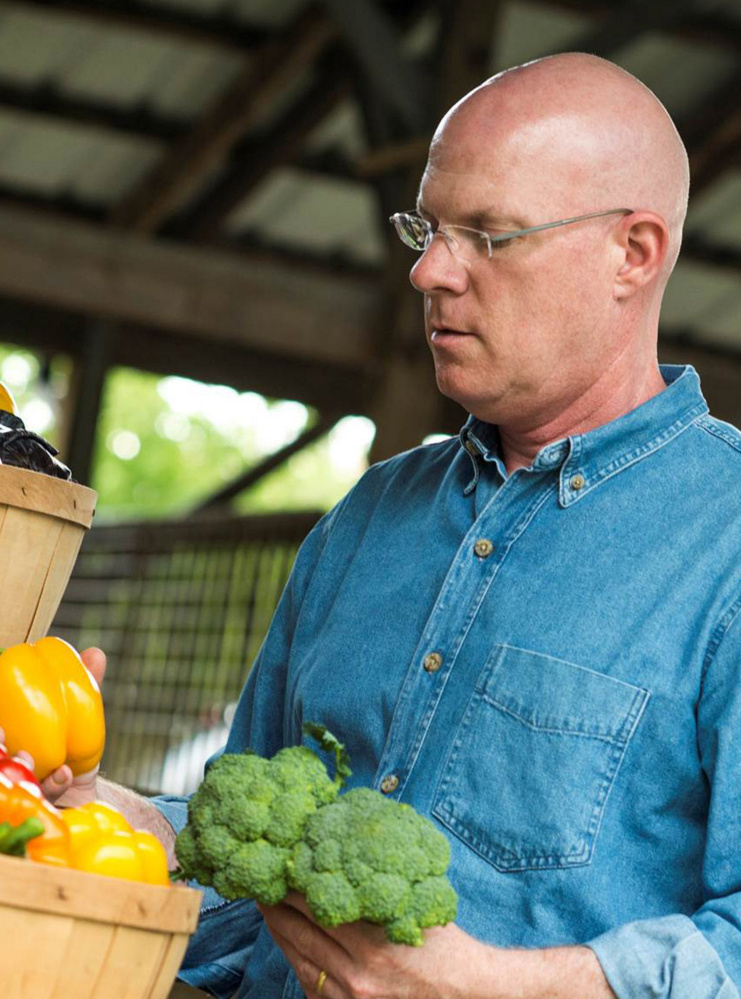At the recent E2Tech Expo, a daylong summit on Maine’s energy, environmental and “cleantech” business sector, keynote speaker John Mandyck talked about the food wasted worldwide – not just the apalling amount that gets tossed in the garbage in a world where 805 million people are chronically undernourished, but how much that waste contributes to climate change. And how that could be fixed.
We called him up to talk about “Food Foolish: The Hidden Connection Between Food Waste, Hunger and Climate Change,” the book he co-wrote with a colleague. He’s in the refrigeration business, but we refrained from asking if his refrigerator was running.
AT THE OFFICE: Mandyck was just promoted to chief sustainability officer for United Technologies worldwide. He’s been with the company, which owns Carrier, a company that develops cold shipping in marine containers, road transport and supermarket display cases. He also holds a number of positions on boards, chairing one for the Urban Green Council in New York and serving as a member of the Corporate Council at Harvard’s Center for Health and the Global Environment. But, you might ask, what does he do? He worries about the cold chain.
COLD WHAT?: That’s the term used for the method of transporting perishable foods. In the book, Mandyck uses the example of bananas, hand-picked while green, padded and wrapped, hauled from a plantation to a packing station, where they are washed, inspected, treated and boxed for transport. Then they’re put in trucks or shipping containers and taken to ships, where they’re held at a precise temperature again, then off to the shops and into refrigerated trucks to be taken to a warehouse and then to their final destination. Ideally, they’ve been preserved the whole way, via temperature control. There is a better than good chance that Carrier equipment was involved along the way. “We keep more food fresh before it reaches your refrigerator than anyone else on the planet.”
WHAT’S FOOLISH ABOUT FOOD: Naturally then, he thinks a lot about food, and in recent years, has grown concerned about feeding the ever-expanding population. “We don’t think we have the land or the environmental license to do that.” Moreover, we’re not distributing – or using – what we’ve already got efficiently or wisely. “We live on a planet with 7 billion people and only 6 billion are getting enough.” What’s foolish is how much food gets wasted, either spoiled before it gets to market or purchased and tossed away at home after spending a week or so neglected in the fridge. “Where else do we tolerate 40 percent inefficiency?” He wants to reduce that. “It’s probably unrealistic to think we’ll have zero food waste, but there is no reason to accept 40 percent waste.”
SOLUTIONS? Mandyck definitely belongs to the whole waste-not-want-not school of thought. He says that more than 50 percent of the food that gets wasted could have benefited from simple refrigeration. Obviously, the world’s biggest refrigeration company wants to expand its business. But Mandyck is also advocating for consumers to waste less. That means planning more before you hit the store and buying less when you get there. He says he does the shopping for his family, and since he started researching his book (which is really more like a fat pamphlet) his buying habits have changed. “Like many people I would buy with my eyes,” he said. “The food looks beautiful and you put it in your cart and take it home.” Where it may end up being wasted. “Now if I don’t have a plan for the food, I don’t buy it.” He’s become equally gung-ho about doggie bags. “There is no shame about taking that food home and enjoying it a second time.” (We personally have never experienced this shame.)
CHANGING CLIMATE CHANGE: And yes, Mandyck has noticed how beautiful the food looks at Maine farmers markets and in restaurants. He has been vacationing in Maine for about 15 years and recently bought a house in Ogunquit so he can come back every summer. Mandyck wants us to consider that yellowing head of broccoli in our vegetable drawer (which has a good chance of having been grown in Maine; that’s a big crop for us.) It took 5.5 gallons of water to grow it. Water shortages are a problem worldwide. “This is a gift from nature that shouldn’t be taken for granted.” Eat your broccoli. He’ll be working on the refrigeration issue.
Send questions/comments to the editors.




Comments are no longer available on this story